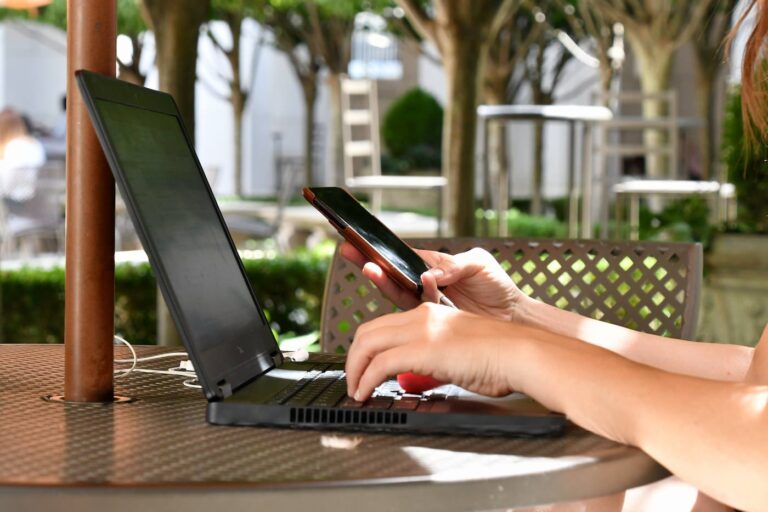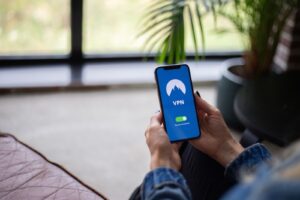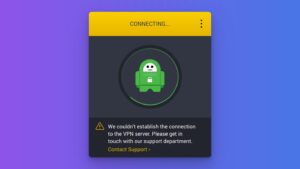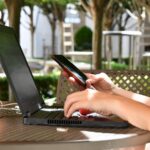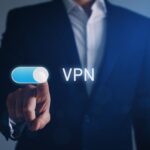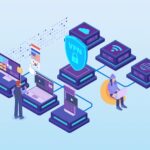When you connect to a Wi-Fi hotspot in a public location, it may seem like a convenient way to access the internet on the go. However, it’s crucial to be aware of the risks involved, particularly with fake hotspots.
These false hotspots can appear legitimate but are set up by malicious actors with the intent to compromise your digital security. Understanding how and why these threats exist is the first step toward protecting your personal information from falling into the wrong hands.

The lure of free Wi-Fi is strong, but the consequences of connecting to a fraudulent network can be severe. Cybercriminals can use fake hotspots to intercept your sensitive data, such as login credentials, banking information, and personal identification numbers. Once they have this information, they can commit identity theft, fraud, and other cybercrime.
As you enjoy the convenience of public Wi-Fi, it’s essential to be vigilant and recognize the signs of unsafe networks to mitigate the inherent risks.
👋 This post contains affiliate links, and I may earn a commission at no extra cost to you.
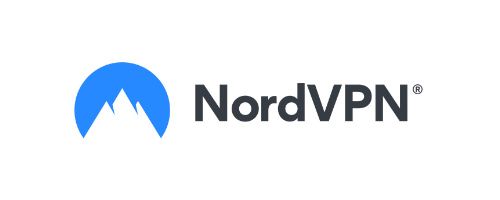
Special NordVPN Offer!
Starting at just $2.99/month!
Get VPN protection from NordVPN, one of the most reliable VPN companies in the world!
Key Takeaways
- Be wary of the security dangers when connecting to public Wi-Fi hotspots.
- Understand the potential consequences of using unsecured or fake networks.
- Use recommended strategies to safeguard your data on public networks.
Understanding Wi-Fi Networks
When you connect to a Wi-Fi network, you are hooking up your device to a local wireless infrastructure, which allows you to access the internet without a physical connection.
There are different types of Wi-Fi networks, ranging from your secure home setup to less secure public Wi-Fi available in coffee shops, airports, and other locations.
The security of a Wi-Fi network largely depends on encryption. Encryption scrambles the data you send over the internet into a code so it is not easily readable by others.
Secure Wi-Fi uses protocols like WPA2 or WPA3 to protect your information. Look for networks using these security measures to maintain safer connectivity.
Public Wi-Fi networks are convenient, but they often lack strong encryption, making it easier for cybercriminals to intercept your data.
It’s essential to verify the legitimacy of a public Wi-Fi before connecting. Avoid networks with suspicious names or those that do not require a password.
Here’s a quick checklist for using public Wi-Fi safely:
- Verify the network name with staff if in a business.
- Use networks requiring a password when possible.
- Avoid accessing sensitive personal information.
How Can a VPN Protect You
A VPN (Virtual Private Network) protects you from false hotspots, sometimes known as “Evil Twin” hotspots, by encrypting your internet traffic.
By using encryption, you can ensure that even if you mistakenly connect to a malicious hotspot disguised as a legitimate Wi-Fi network, the data exchanged between your device and the internet is secure and unreadable by the attacker.
When you join to a false Wi-Fi network without utilizing a VPN, the network’s operator (the attacker) can track your internet activities.
Recommended VPNs:
- NordVPN – Offers a 1-click Quick Connect feature that instantly connects you to the best server.
- Surfshark – Known for its ability to work in regions or countries that are not VPN-friendly.
- CyberGhost – Recognized as the Best VPN for Mac, offering optimized services for macOS users.
- PIA (Private Internet Access) – Noted for its advanced security features and high customizability.
- Windscribe – Allows users to pick and choose the features they want via a build-a-plan system.
- ExpressVPN – Known for its diskless servers, running everything in RAM for enhanced security.
Identifying Fake Hotspots
When connecting to Wi-Fi, you need to be vigilant about fake hotspots. These rogue networks are designed to mimic legitimate access points, luring you into connecting to them. Here’s how to spot these potential threats:
- Check the Network’s Name: Legitimate businesses often name their Wi-Fi networks after themselves. Be wary of generic names like “Free Public Wi-Fi” or “Coffee Shop Wi-Fi” that could be rogue access points.
- Look for Suspicious Activity: Evil twin hotspots are a form of fake Wi-Fi hotspots set up by cybercriminals. If you notice a Wi-Fi network that appears duplicated or has a slightly altered spelling, avoid it.
- Pay Attention to the Login Process: Authentic networks usually require some form of login credentials or terms of acceptance. A fake hotspot may not prompt such steps or might ask for more personal information than usual.
- Use Secure Websites: Ensure the websites you visit use HTTPS, indicated by a lock symbol in your browser. This adds a layer of protection, even when you’re unsure about the network’s authenticity.
- Utilize a VPN: A Virtual Private Network (VPN) encrypts your data. Even if you mistakenly connect to a fake hotspot, your information has a layer of encryption that’s difficult for attackers to breach.
The Dangers of Unsecure Connections
When you connect to a public Wi-Fi network, you may inadvertently expose your personal information to cybercriminals. Understanding the threats is key to protecting your privacy and financial well-being.
Privacy and Data Theft
Cybercriminals often set up malicious hotspots to steal sensitive information. When you connect, they can intercept your online activities, access login credentials, emails, and other personal information.
This can lead to identity theft and data theft, including the illicit collection of your private conversations and transactions.
Financial Risks
Using a compromised connection may place your financial information at risk. Hackers can capture banking details, online banking sessions, and credit card information to commit financial fraud.
Phishing attacks launched from unsecure connections can trick you into divulging banking credentials, leading to direct financial loss.
Malware and Virus Threats
Unsecure connections may also be used for malware injection, including ransomware, spyware, and viruses. These malicious hotspots can initiate drive-by downloads, which occur without your knowledge.
Always ensure your antivirus software is up-to-date to mitigate these risks.
Protection Strategies
When connecting to public Wi-Fi, your data is at risk of interception. Strengthening your defense against unauthorized access is critical. Implementing robust protection strategies can significantly enhance your security and privacy while using public hotspots.
Encryption and Secure Connections
Ensure your connections are encrypted. Use Virtual Private Networks (VPNs) which encrypt data traffic between your device and the VPN server. This makes it difficult for eavesdroppers to intercept your information.
Always look for HTTPS in the website URL, which indicates that the connection is secured with SSL/TLS encryption.
Authentication and Firewall Implementation
Implement firewalls and two-factor authentication (2FA). Firewalls serve as a barrier between your device and potential threats, scrutinizing incoming and outgoing traffic.
For accounts, two-factor authentication adds an additional layer of security beyond just strong passwords, making unauthorized access more challenging.
Safe Browsing and Device Practices
Be cautious of the websites you visit and the networks you connect to.
Avoid accessing sensitive information such as banking sites on public Wi-Fi.
Keep your smartphone’s and mobile device’s security measures up to date and limit the amount of personal data you share on social media to reduce the risk of identity theft.
Vigilance Against Phishing and MITM Attacks
Stay alert to phishing scams and man-in-the-middle (MITM) attacks.
Do not click on suspicious links, especially from unsolicited emails or messages.
Be skeptical of Wi-Fi hotspots that mimic legitimate businesses and train staff to recognize the signs of a phishing attempt.
Secure Network Usage in Public Places

Special NordVPN Offer!
Starting at just $2.99/month!
Get VPN protection from NordVPN, one of the most reliable VPN companies in the world!
Public Wi-Fi has become ubiquitous in public places such as coffee shops, airports, and hotels, providing the convenience of staying connected. However, the threats associated with these unsecured networks are very real, from eavesdropping to data theft. Here are critical points you need to remember to safeguard your digital footprint.
Identify Legitimate Hotspots: Before logging into any network, confirm that you’re connecting to an official hotspot provided by the establishment. Cybercriminals often set up fake hotspots to mimic legitimate ones.
- Verify Network Names: Ask staff for the correct network name and password.
- Avoid Automatic Connections: Disable your device’s feature to automatically connect to available Wi-Fi networks.
Use Secure Connections: When you’re on public Wi-Fi, ensure the sites you visit are encrypted, indicated by HTTPS in the URL.
Consider the use of a Virtual Private Network (VPN) to create a secure tunnel for your online activities.
Limit Data Sharing:
- Turn Off File Sharing: Go to your device’s system preferences or control panel to disable file sharing settings.
- Use Firewalls: Activate your firewall to act as a barrier between your device and potentially harmful traffic.
Be Cautious With Sensitive Transactions: Avoid conducting sensitive work that requires inputting passwords or credit card information while connected to public Wi-Fi.
Stay Updated: Keep your software and antivirus programs updated to protect against the latest vulnerabilities.
Best Practices for Personal and Corporate Safety
In safeguarding against fake hotspots, prioritizing both personal device security and corporate network defenses is crucial. You’ll learn to secure your credentials and enhance your privacy through effective strategies.
Regular Security Updates and Patch Management
Ensure that all your devices, including smartphones, PCs, and Macs, undergo regular security updates.
Operating system and application patches are your first defense line, protecting against vulnerabilities that could compromise your personal accounts and corporate data.
Set updates to automatic to consistently maintain the highest level of defense.
Educational Measures and Policy Enforcement
Invest in cybersecurity education for your staff. Emphasize the distinction between authentic networks and potentially harmful fake hotspots.
Training should cover best practices for safe travel and remote work. For example, employees should verify network legitimacy before connecting.
Enforce strict policies to ensure that employees understand the importance of such measures. Make sure they also understand the potential financial and privacy risks involved when handling corporate and personal data.
Implementing Advanced Cybersecurity Defenses
Incorporate robust cybersecurity defenses such as antivirus programs and firewalls. Also, consider network security solutions regulated to meet current standards.
When traveling or working remotely, use trusted virtual private networks (VPNs). Ensure that all sensitive applications have strong encryption for data in transit.
Advanced cybersecurity defenses protect not just against fake hotspots but also a broad range of cyber threats targeting your valuable data.
Frequently Asked Questions

Special NordVPN Offer!
Starting at just $2.99/month!
Get VPN protection from NordVPN, one of the most reliable VPN companies in the world!
Understanding the risks of connecting to public Wi-Fi is crucial for protecting your sensitive information from malicious activities.
What are the dangers associated with using public Wi-Fi connections?
Connecting to public Wi-Fi can expose your device to cyber threats such as data interception, malware distribution, and unauthorized access to your personal files.
Can using unsecured Wi-Fi in hotels compromise your digital security?
Yes, using unsecured Wi-Fi in hotels can compromise your digital security. Hackers can create fake hotspots to capture your internet activity and steal sensitive information.
What types of personal information are at risk when accessing free public Wi-Fi?
When accessing free public Wi-Fi, your personal information such as passwords, email content, and banking details can be vulnerable to cyber criminals.
What are the security implications of auto-connecting to public hotspots?
Auto-connecting to public hotspots increases the likelihood of joining a fraudulent Wi-Fi network. This can lead to malware infections and the harvesting of your personal information.
How can connecting to a fraudulent Wi-Fi network affect you?
Connecting to a fraudulent Wi-Fi network can lead to identity theft and financial fraud. This is because your private data, including login credentials, is at risk of being stolen and misused.
Are there specific risks involved in conducting banking transactions over public Wi-Fi?
Conducting banking transactions over public Wi-Fi is highly risky. It can give attackers a direct path to your financial accounts and potentially result in financial loss.

